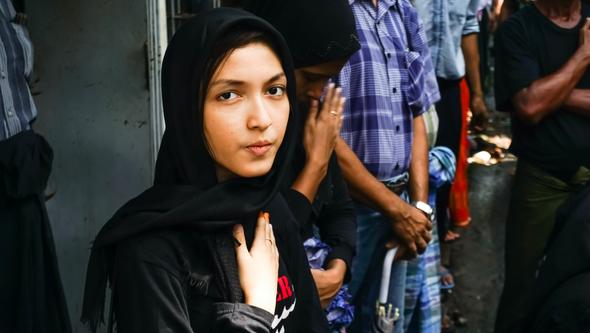
- Home
- Research
- Find research
- "Unrealistic to assume that integration can be rushed"
"Unrealistic to assume that integration can be rushed"
The war in Ukraine and subsequent arrival of large numbers of refugees, the negative economic and financial outlook combined with the growing right wing populist political opinion in many European countries.
The challenges are many and the research at Organizing Integration is more important than ever, according to Andreas Diedrich, Program Leader and Associate Professor of Management and Organization Studies.
Q: The research program Organizing Integration has been up and running for five years, how would you sum up the research so far?
A: – The OI program has explored how labour market integration of foreign-born persons is organized in practice. OI researchers have used qualitative research methods including field studies, a narrative study of 32 popular novels connecting to migration/integration experiences, and stocktaking of contemporary integration initiatives. OI has explored the role of widely-known integration support activities (e.g the Establishment Program) and of innovative practices (e.g. bottom-up initiatives promoting immigrant entrepreneurship and novel approaches to social procurement).
– Results illustrate how integration support often means that individuals – both immigrants and native-born persons - and organisations must change their accepted ways of working with integration support and their taken-for-granted understandings of what integration means in the first place.
Such change takes time. But integration initiatives are often organized in short term projects, with special conditions, and which are expected to produce rapid results.

Results illustrate how integration support often means that individuals – both immigrants and native-born persons - and organisations must change their accepted ways...
– However, it is unrealistic to assume that integration can be rushed; it requires a long-term perspective and deliberation from all involved, including immigrants.
– Our field studies have also illustrated the role of unintended changes/events on integration support efforts and attempts at managing these (e.g. the reorganization of the Public Employment Service and the recent changes unfolding due to the COVID-19 pandemic have both severely affected the work as part of integration support initiatives with consequences for the organizers and the foreign-born persons).
– Also integration support is complex and often includes a multitude of actors and issues of coordination give rise to ambiguity, shifting goals and mismatches in activities.
– This is further exacerbated as funding for integration support is decentralised and complex, being provided by multiple financiers (e.g. European Social Fund, County Administrative Boards), and based on constantly-shifting political agendas.
– We have also explored the meaning of the concept of integration itself by examining how actors make sense of what constitutes “successful” integration, who is supposed to integrate, and how such integration is measured in practice.
– These studies question the widespread assumption that only immigrants need to integrate and instead see integration as a process involving immigrants and natives.

Q: What impact has your research had to date?
A: – On the research front, we believe that the OI program has played an important role in drawing attention to the role of organizing and management in the context of labour market integration of foreign-born persons. When the program started in 2016 there was little research interest in these matters, while today a growing number of special issues in academic journals bears witness to the increasing importance attached to how integration is organized in practice in several disciplines.
– Results from the project have been disseminated through 17 refereed journal articles, 3 Special Issues in international academic journals, 1 book, 3 book chapters, 8 refereed research reports and close to 50 conference papers.
When the program started in 2016 there was little research interest in these matters...
– Furthermore, the OI program has engaged in extensive and continuous dialogue with practitioners, collaborating with them at times to change integration support practices. One such intervention led to the discontinuation of a major integration support initiative that did not deliver on its promises, for example. And one OI researcher has advised the European Social Fund on novel methods to be used by the Fund to assess their integration support projects in the future.
– Notably, the new assessment methods include a much stronger focus on the organizational aspects of the projects it funds. OI researchers have also regularly presented their results to practitioners at local, regional and national conferences, workshops and other events.

Q:What can we look forward to this autumn when it comes to research and webinars from Organizing Integration?
A: – We plan to organize several webinars during the autumn where researchers will present the results from their studies. Also, in October 2022 we plan to submit the final manuscript for the OI book entitled “Organizing integration: practices and consequences” to the publisher. OI researchers have also been accepted to attend a range of conferences in Sweden and abroad.
– During the autumn we are also starting preparations together with the Center on Global Migration for the 2. Organizing Migration and Integration in Contemporary Societies (OMICS) conference planned to be held in Gothenburg in Nov 2023. The previous OMICS conference attracted over 200 participants from all over the globe and was a great success.
Q:Which are the most urgent questions right now, in your opinion?
A: – Some of the most urgent questions relate to the war in Ukraine and subsequent arrival of large numbers of refugees from that country in the European Union and the increasingly negative economic and financial outlook, combined with a growing right wing populist political opinion in many European countries. Both these issues bring with them some risks for foreign-born persons seeking employment.
– When it comes to refugees, the arrival of large numbers of refugees from Ukraine brings with it the risk that different refugee groups are pitted against one another – in the labour market and society. An urgent question in the future will be to ensure that refugees are not divided into “first” and “second class” refugees and treated differently because of where they come from.
foreign-born persons, and refugees in particular, might face a much tougher time to find sustainable employment solutions and/or remain employed
– Also, the increasingly negative economic and financial outlook, combined with a growing right wing populist political opinion in many European countries, means that foreign-born persons, and refugees in particular, might face a much tougher time to find sustainable employment solutions and/or remain employed.
– Previous studies have shown that crises have the tendency to increase the marginalization of already marginalized groups. At the moment it seems as if one crisis is succeeding another one ...